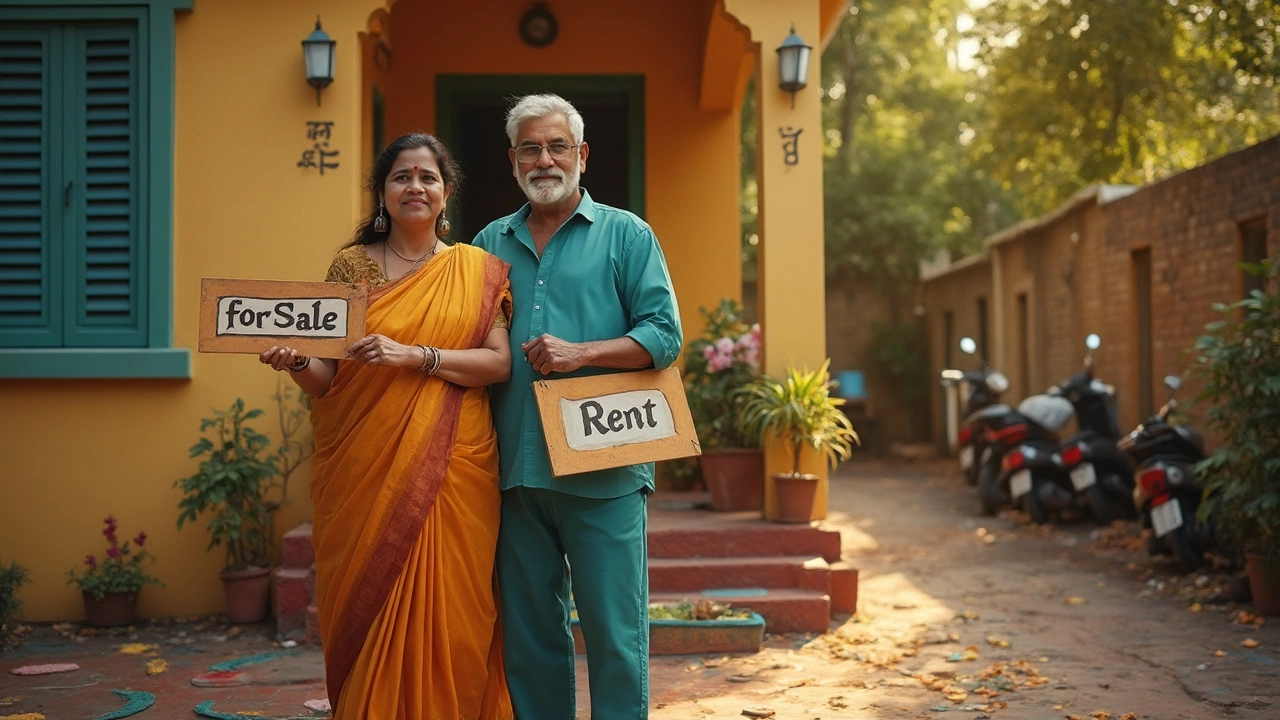Sell a Paid-Off House or Rent It? Pros and Cons Explained

If you’re staring at a house that’s totally paid off, you’re in rare company—most people never quite get there. That leaves you with a big question: should you cash out and sell, or keep the place as a rental and let it (hopefully) earn money for you?
On one side, selling gives you a pile of cash, fast. You could use it to buy something else, invest, or just pay off other debts. No more dealing with repairs, late-night calls, or paperwork. But if the market’s hot, that might mean you’re walking away from steady rental income that could easily beat what you’d get from a typical savings account or even the stock market—especially if you price the rent right.
Renting, though, comes with its own rollercoaster. You’re now the landlord, with all the fun (and sometimes chaos) that brings. Repairs, vacancies, and property taxes are still on you. But with no mortgage chewing through your monthly rent, the cash flow can be surprisingly solid. The trick is really about what you want—fast money now or steady payments rolling in over the long haul.
- What Changes When the Mortgage Is Gone?
- Crunching the Numbers: Selling vs. Renting
- Taxes and Hidden Costs No One Tells You
- Dealing With Tenants: Fun or Headache?
- Lifestyle Freedom and Flexibility
- Common Mistakes and Smart Moves
What Changes When the Mortgage Is Gone?
Paying off your mortgage feels like dropping a huge weight. Suddenly, you’re not sending hundreds or even thousands to the bank every month. That single change flips your whole outlook, especially if you’re wondering about renting or selling your paid-off house.
First, with the mortgage gone, your monthly expenses shrink. Instead of shelling out for the loan, you’ll only need to cover property taxes, insurance, basic utilities, and maintenance. For most folks, that could be less than half of what they were paying before.
| Cost | With Mortgage | Without Mortgage |
|---|---|---|
| Mortgage Payment | $1,400 | $0 |
| Property Taxes | $300 | $300 |
| Insurance | $120 | $120 |
| Maintenance | $150 | $150 |
| Total Monthly Cost | $1,970 | $570 |
This isn’t just about saving money—it changes your options. Renting the property now means the rent money is mostly profit, not swallowed up by a loan. For example, if average rent is $1,800 in your area, after you pay off taxes and repairs, what you keep is dramatically more than before.
Freedom is another key bit. Suddenly, you don’t have to worry about foreclosure if life throws you a curveball. You’re not locked into long-term payments, so making decisions about the property—whether to sell your house or keep it as a rental property—feels a lot less stressful.
Don’t forget: you now own 100% of the equity. That’s actual cash you could tap if you want to sell or maybe use for a home equity line if you want to reinvest in something else, like another real estate deal or a dream vacation.
Bottom line? The game changes completely. The lack of a monthly mortgage isn’t just a relief. It opens up a world of options, especially when you’re thinking about whether to rent or sell. Now it’s just a matter of what’s smartest for your situation.
Crunching the Numbers: Selling vs. Renting
Let’s get right to the point: deciding to sell your house or use it as a rental property pretty much comes down to the math. You’ve got to look at what you’d pocket from a sale right now versus what you could make by renting it out year after year.
First, if you go the selling route, figure out the home’s current value. Subtract normal costs like agent commission (which averages around 5-6%), closing costs, and any quick repairs you’d need to get top dollar. So if your house sells for $375,000 and you pay 6% in fees, you’re giving up $22,500 right off the top. Not to mention taxes if you don’t qualify for the capital gains break.
Switch over to renting. Here, you want a realistic look at monthly income. If you charge $2,200 rent, but still have to cover property tax, insurance, maintenance, and maybe pay for a property manager, what’s really left? Let’s say taxes and insurance total $350 a month, and set aside another $150 for repairs. You could still clear around $1,700 just sitting in your account. But don’t forget vacancies—most landlords figure on the place being empty at least one month every year.
| Sale | Yearly Rental | |
|---|---|---|
| Upfront Cash | $352,500 (after fees) | --- |
| Ongoing Income | --- | $20,400 (if rented every month) |
| Ongoing Costs | None | $6,000 (taxes, insurance, repairs, vacancy) |
| Net in 1st Year | $352,500 | $14,400 |
This table is just a quick example. Every market’s different. In places where rents are high and property prices have peaked, hanging onto your place as a rental often wins out over a quick sale.
Want a shortcut for comparing? Try the 1% rule: if you can rent your house for about 1% of its price each month ($3,000 rent for a $300,000 home), renting usually makes sense. If you’re way under that, selling might be smarter.
Bottom line: run these numbers for your actual property. Don’t guess, and don’t let emotion take over—you’re making a business decision, whether you’re thinking about a rental property or cashing out to sell house fast.
Taxes and Hidden Costs No One Tells You
Taxes can seriously change the math when you're figuring out whether to sell house or keep it as a rental property. Most people focus on the big number they see in a home estimate or the monthly rent, but there’s more going on behind the scenes. Let’s break it down.
If you sell, you’ve got to deal with capital gains tax. That’s the tax on the profit from the sale. The IRS lets you skip taxes on the first $250,000 of gain if you’re single or $500,000 if you’re married, but only if you’ve lived in the house as your main home for at least two out of the last five years. Miss that mark and you could be handing over a huge chunk to Uncle Sam. According to the IRS:
"If you have a capital gain from the sale of your main home, you may qualify to exclude up to $250,000 of that gain from your income, or up to $500,000 if you are married filing jointly."
Renting the place opens a different can of worms. Sure, most of the rent goes into your pocket because the house is paid off. But you can’t forget about property taxes, insurance (landlord insurance is pricier than regular homeowner insurance), and repairs. Some expenses, like repairs and certain improvements, are tax-deductible, which helps. But every year, you’ll still face tax paperwork. Plus, if the home goes up in value while you rent it, your capital gains tax bill gets bigger if you sell later, especially since you start to lose the homeowners exclusion once you no longer live there.
Another curveball: depreciation. The IRS lets you deduct a bit of the home’s value every year to offset rental income (called depreciation), but if you ever sell, they’ll try to take some of that back—this is called depreciation recapture. That hits at a higher tax rate than regular capital gains tax. A lot of people get surprised by this one.
Don’t forget about other costs, either. Here’s a quick look at what can add up fast when you rent:
- High property taxes (check if your city or county has recently raised them)
- Landlord insurance premiums
- HOA fees, if your property is in a community association
- Repairs and regular maintenance—roof, plumbing, HVAC, and even simple things like replacing appliances
- Property management fees if you don’t want to deal with tenants directly (can be up to 10% of your monthly rent)
- Vacancy periods (months where you have no renter but still pay the bills)
Check out these typical yearly costs for rental owners in the U.S.:
| Expense | Average Annual Cost |
|---|---|
| Property Taxes | $3,500 |
| Landlord Insurance | $1,400 |
| Repairs/Maintenance | $2,000 |
| Property Management | $2,500 |
Bottom line: both selling and renting a paid-off house come with costs people ignore until it’s too late. Run the real numbers before you decide, and maybe even chat with a tax pro—saves a lot of headaches down the road.

Dealing With Tenants: Fun or Headache?
Turning your paid-off house into a rental property isn’t just about sitting back and watching money roll in. Being a landlord puts you right in the middle of people’s real-life dramas and everyday needs. Sure, there are plenty of good tenants out there, but no matter how much screening you do, sometimes you hit a rough patch—late rent, unexpected damage, folks vanishing overnight.
Let’s break down what this job actually looks like day-to-day:
- Screening tenants: Getting the right person in the door is half the battle. Most pros recommend running background checks, credit checks, and calling a couple of past landlords. Skipping any part of this usually comes back to bite you.
- Ongoing maintenance: Even with a newer house, things break—leaking faucet, busted AC, or major appliances giving up. You’ll need a plan for getting repairs done fast.
- Communication: Tenants will text, call, or email when anything goes wrong, or even just to ask about the Wi-Fi password. Some questions are urgent, some are not, but you have to handle them either way.
- Collecting rent: Sounds easy, but late payments happen. If they fall more than a month behind, you might need to start eviction proceedings, which can be stressful and expensive.
Now, let’s talk numbers. According to a national landlord survey in 2024, about 35% of small landlords reported at least one "difficult" tenant a year. The same data showed that roughly 12% of rental income, on average, can be eaten up by tenant turnover, missed payments, and damage. Here’s how that might look:
| Issue | Average Annual Cost (USD) |
|---|---|
| Tenant Turnover | $1,800 |
| Missed/Late Rent | $1,200 |
| Property Damage (beyond deposit) | $800 |
But it’s not all doom and gloom. Some landlords swear by using solid property management software, or even hiring a local property manager (usually for around 8–12% of monthly rent). This cuts down on stress, but it eats into profits too.
If you’re after that true “passive” income, owning a rental property without doing the legwork is tough unless you pay someone else to cover those headaches. On the flip side, some folks actually like building relationships with tenants and see it as adding value to their community.
Lifestyle Freedom and Flexibility
When your house is paid off, you’ve got something most people only dream about: choices. This is where selling versus renting really comes down to more than just numbers. Your next move affects how much freedom you have and how easy it is to change things up if life throws a curveball.
If you sell, you get a big stack of cash and, in most cases, you’re totally free to move wherever you want. No more ties to the property, no responsibility for repairs, taxes, or finding tenants. This is super handy if you’re planning to travel, relocate for work, or just want to simplify. A 2024 survey showed that over 60% of retired homeowners who sold their paid-off house did it just for that peace of mind and flexibility.
With renting, you’re still attached to the property and the area. Think about it—you may have steady income, but you’ll likely need to stay involved, whether that’s hands-on or through a property manager. If you plan to live across the country or out of the country, managing a rental property can get complicated fast. Property management companies can help, but they usually take 8-12% of the monthly rent. That’s money right out of your property income.
Another thing: emergencies. If you suddenly need money—maybe for medical bills or a family need—selling lets you unlock a big chunk of cash quickly. With renting, the home’s value is locked up and takes time to access, unless you do a cash-out refinance (and that means more paperwork and fees).
Here’s a side-by-side to help you see how these choices stack up:
| Option | Upside | Flexibility |
|---|---|---|
| Sell House | Immediate cash, simple taxes | Move anywhere, no commitments |
| Rent It Out | Steady monthly income, keeps property | Must manage property, less freedom to relocate without a plan |
So, ask yourself: Are you after cash and a clean slate, or do you want that ongoing rental income—with a few strings attached? Your choice shapes how much freedom you really get from a fully paid-off house.
Common Mistakes and Smart Moves
It’s easy to get tripped up when you own a paid-off house and you’re torn between keeping it as a rental property or selling it. People tend to focus on the big numbers—cash from a sale or rental income—but overlook the smaller details that can chip away at your profits or even cause a headache down the line.
First off, a classic mistake people make is underestimating the real cost of being a landlord. Repairs eat up cash, even if your house is newer. Water heaters die, roofs leak, and if you don't have a fund for surprise bills, you’ll feel the squeeze. Property taxes and insurance tend to go up, not down—so don’t get caught off guard. According to National Association of Realtors data from 2024, landlords who set aside 20% of their rental income for maintenance and vacancies felt the least financial stress.
Another slip-up? Not running the numbers before you decide to sell. Some folks sell their house just because it feels simpler, but if you rush, you might do it during a slow market and leave money on the table. Timing matters: Zillow data shows homes sold in spring or early summer bring up to 18% more compared to winter months. If you must sell, check local trends—don’t just trust your gut.
A lot of new landlords fall for the DIY trap. Doing every repair yourself or trying to manage tenants by the seat of your pants usually burns out your weekends and your patience. If you aren’t handy or nearby, hiring a property manager could save your sanity and might even boost your returns—they often help find better tenants and handle problems fast, for about 8-12% of your monthly rent.
There are some smart moves too. Before deciding, talk to a local tax advisor. Tax rules change fast and rental income is taxed differently than capital gains from a home sale. The IRS lets you exclude up to $250,000 ($500,000 if married) in profit from taxes when selling your primary home if you’ve lived in it at least 2 of the last 5 years. Miss that window and you pay more—so don’t lose that opportunity.
- If you choose to sell house, time it with the market, and consider quick but worthwhile fixes to boost your price—things like paint, landscaping, and minor kitchen updates.
- If you go the rental property route, screen tenants really well. Use background checks and ask for references. It’s a pain at first, but nothing ruins your cash flow faster than a bad tenant.
- Stay organized. Use apps or spreadsheets to track rent, expenses, and repairs. If you ever sell, buyers love seeing clear records—it makes your place more valuable.
One more tip: check your local landlord-tenant laws, as rules about evictions, deposits, and repairs can be strict and changing fast. Don’t assume what worked somewhere else will work for you. Knowing your obligations saves you trouble later.
Smart property owners think several steps ahead and aren’t afraid to get advice from real pros along the way.








Write a comment